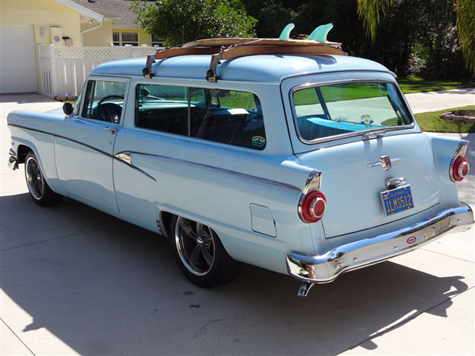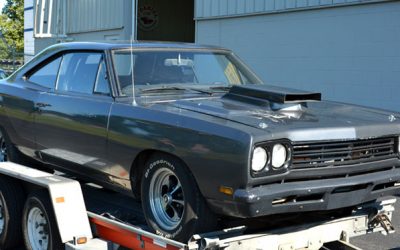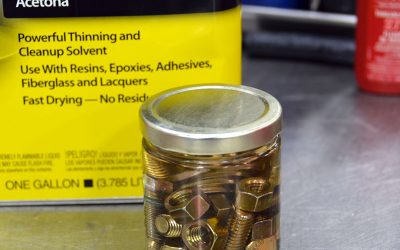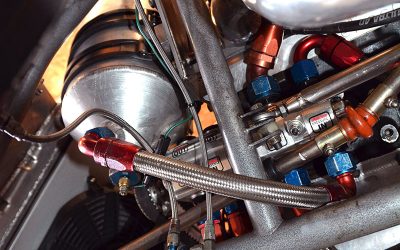“What’s important is what we did and what we imagined doing while we lived.â€
 No, I’m not going all philosophical on you, but once in a while something important occurs to me, something that reflects the very essence of our lives. In this case, how what we’re passionate about and what we apply our imaginations to is more meaningful than we probably ever notice.
No, I’m not going all philosophical on you, but once in a while something important occurs to me, something that reflects the very essence of our lives. In this case, how what we’re passionate about and what we apply our imaginations to is more meaningful than we probably ever notice.
Route #79 is a straight shot through the rolling farm country from Freehold to Matawan in central New Jersey. Long, long ago while driving down that road I spotted an unusual car for sale in a driveway. It was a battleship-gray ‘56 Ford two-door station wagon (who knew they even built wagons without four doors?). I stopped in and found out it was powered by a 292 two-barrel Y-Block V8 through, get this, a three-speed stick on the column.
My imagination went wild. Just think of the great surfer-type hot rod that could be transformed into. Just think of it! Probably not another one known to man.
Although the body wasn’t rotted out, the paint was shot and it had so little compression that you had to crank and crank to get it started, then the blow-by through the road-draft tubes practically made smoke rings. The brakes and front end were far gone, too, as was the interior. At least being a ‘56 it had a 12V system, so I wouldn’t have to deal with any extra obsolete technology.
I think I paid $60 for it, and the guy was happy to get it out of his yard. It ran well enough to drive home — safety was far down on my list of priorities.
It didn’t seem worth the trouble to rebuild that anemic engine, especially since I’d had my eye on the 312 I’d stumbled across in a wrecked ‘57 Ford hardtop at my favorite junkyard. I clearly remember giving $114 for it (the odd amount was probably what I had on me — those transactions were anything but formal).
I worked under the big box elder tree next to my parents’ house, Grandpa’s chain hoist suspended from a substantial limb and a WWII nylon arresting cord from an aircraft carrier carefully knotted into an engine cradle at just the right angle. Delicious delusions of grandeur made the work fun, and I grinned continuously. My girlfriend’s younger brother was helping me in the hopes of learning something about working on cars.
By the time I had most everything together (I’m surprised I can say that considering how stupid I was), it was getting to be a chilly evening in late October, although the day had been beautiful, and we really wanted to take a ride. The nickname I’d acquired from cobbling up means of operating various carburetors in decidedly non-stock applications was “Linkage,†or just “Link.â€Â It was too dark and cold to do any field engineering right then, though, so I just tied a piece of clothes line to the throttle lever.
Picture this: Driving a car with your right hand on the wheel, your left out the window pulling on a length of cotton rope in a rough simulation of accelerator-pedal action, and no hand available for changing gears. So, my helper sat next to me and worked the shifter.
Even though the vacuum-operated secondaries of the crazy Ford four-barrel (the bowl and float were above its bores) weren’t opening, that wagon jumped very well indeed. With the potential of the basic concept proved, I could start dreaming of how I’d proceed with all the modifications and fine work.
Then, practical reality set in. I changed jobs and enrolled in college (low-interest school loans made that possible, with my dad’s co-signature), and I really had no business building and restoring a car for, well, fun. There was no time for much beyond reading, studying, and working as many hours as I could.
So, the Ford got parked at the edge of the woods on my parent’s land, and there it sat. And sat. I still had fantasies about how great it could be, but, though young, I was realistic enough to know that it wasn’t going to happen. I even started to steal parts from it for the cars I needed to get me to work and school.
The alfalfa and cat briars grew up around the poor thing, and it started to rust out. I never had the time to do anything but cast a wistful look at it from time to time.
Some years later, a cousin of mine who had a family and tried to make extra money with scrap metal, asked if he could have it. It was an emotional wrench, but I said, “Sure,†which I have to think was one of my most mature moments. He arrived with his 3/4-ton pickup, torches, and a utility trailer, cut it up into manageable pieces, and took it away. Perhaps some of its steel found its way into the skeleton of a skyscraper, somewhat as buried bodies fertilize plants.
Decades ago, I read a 19th-century English novel with the subtitle, “The Way of All Things,†and that common Victorian thought stuck with me. Sure, we’ll all be gone in 50 or 100 years, most of us in a lot less. What’s important is what we did and what we imagined doing while we lived.
What had I squandered? Maybe a couple of weeks’ pay, but nothing else really. The mental discipline expended on solving the problems of bringing the Ford back and turning it into something of which I could be proud had been salubrious exercises for my imagination, making it stronger and more fertile.
Our dreams may not always come to fruition, but just having them teaches us a lot. We invent things in our minds, we make calculations, and most of us put an optimistic spin on what’s actually possible. That last point is an attitude worth cultivating even if it’s often disappointed.
Â




0 Comments